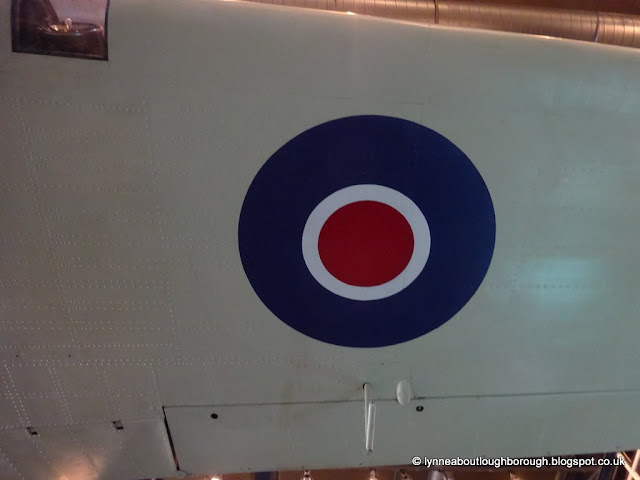On the first visit, I popped along to the ThinkTank Museum. I'd been before, probably about 15 years ago, when the museum was the only building on the cleared land - apart from *Loughborough Connection Alert* the Curzon Building, which was once part of the Curzon Hotel, related to the Curzon Street railway station, and is due to be incorporated into the HS2 development. The Loughborough connection is, of course, with Curzon Street, and our Odeon, Curzon being one of its former names. I wonder if these are named after Montagu Curzon who was a British politician and soldier and son of the First Earl Howe?
 |
| The Curzon building through the museum window |
 |
| Loughborough's former Curzon cinema |
Anyway, today the museum is surrounded by new buildings and interesting plantings. I really wanted to visit again to see the machinery they had on the ground floor - the bean engines, the steam train, the tram, and so on. I was pleased to find a Leicestershire connection in that one of the electricity generating engine was used by William and John Henry Symington for lighting in their corset factory in Market Harborough (which if I remember rightly is the building that now houses the town museum). But, what I didn't expect to find was a connection with Loughborough, but true to form, I accidentally did!
Hanging from the ceiling of the ground floor, and viewable from the upper floors of the museum, were two aeroplanes, one of which is often talked about these days - the Spitfire. The other suspended plane was a Hurricane, designed in 1933 by Sydney Camm, and the information board told me that after its last flight in 1945, it was sent to Loughborough College, where it stayed for an unspecified amount of time. Loughborough College then donated to the Birmingham Museum of Science and Industry, before being displayed a the ThinkTank.
 |
| The Spitfire, followed by the Hurricane |
 |
| The Hurricane |
 |
| The information board |
 |
| The information board |
Jokingly, on the theme of hurricanes, I said to my other half 'I wonder if Alex Higgins ever came to Loughborough?!' ... a quick delve into some resources, and I pulled up an online forum that suggests that he did, where he played against Willie Thorne in Loughborough Town Hall: sounds like a local Derby!! I also discovered that the 1929 World Snooker Championship, which took place between 17th December 1928 and 7th March 1929, was held at a variety of venues in England, Loughborough being one of them!
This particular match in the Town Hall 17th to 22nd December, was a semi-final between Kelsall Prince, and Tom Dennis, and was due to take place over 25 frames. Until halfway through the fourth session the match was close with Dennis was leading, but as he also won the subsequent five frames, it was Dennis who won the match. Dennis eventually lost in the final to Joe Davis.
 |
| Loughborough Town Hall |
Another Loughborough connection on the ground floor of the ThinkTank Museum was the steam engine, and the associated display which mentioned Thomas Cook's first outing, a Temperance outing to Loughborough.
 |
| The information board |
 |
| Local plaque commemorating the visit of Thomas Cook |
And the information board about the hotels associated with railway stations reminded me of our own Great Central Hotel, now a day nursery and flats.
 |
| The information board |
 |
| The former Great Central hotel, Loughborough |
The final connection with Loughborough was in the form of a Mobil Special Land Speed Record Car, designed in 1933 by Reid Anthony Railton. The car broke the World Land Speed Record in 1938, 1939 and 1947, reaching a speed of 384 miles per hour. As far as I know, Reid Railton is no relation to William Railton, architect of Beaumanor Hall, properties on the Garendon Estate and Nelson's Column at Trafalgar Square in London.
 |
| William Railton's Beaumanor Hall |
 |
| William Railton's Nelson's Column |
The other visit I made, after attending the concert, was to the Warstone Cemetery (sometimes called the Mint Cemetery, or the Brookfields Cemetery), over in the jewellery quarter, before walking along the canal to Winterbourne House, and Arts and Crafts former family home, now belonging to the University of Birmingham. In both these places there were connections that reminded me of Loughborough, but I'll leave until next week, as all that walking has made me rather tired ...
You are welcome to quote passages from any of my posts, with appropriate credit. The correct citation for this looks as follow:
Dyer, Lynne (2020). Hurricanes in Loughborough. Available from: https://lynneaboutloughborough.blogspot.com/2020/01/hurricanes-in-loughborough.html [Accessed 19 January 2020]
Take down policy:
I post no pictures that are not my own, unless I have express permission so to do. All text is my own, and not copied from any other information sources, printed or electronic, unless identified and credited as such. If you find I have posted something in contravention of these statements, or if there are photographs of you which you would prefer not to be here, please contact me at the address listed on the About Me page, and I will remove these.
Thank you for reading this blog.






No comments:
Post a Comment
If you have found this post interesting or have any questions about any of the information in it do please leave a comment below. In order to answer your question, I must publish your query here, and then respond to it here. If your information is private or sensitive, and you don't wish to have it on public display, it might be a better idea to email me using the address which is on the About Me page, using the usual substitutions: if you take the email route, our conversation remains private, and is not published on the blog. Thanks for reading the blog.